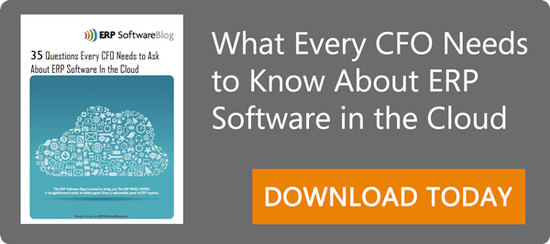Enterprise resource planning (ERP) systems are critical to the success of many business processes. However, over the last decade, cloud-based services have emerged to take some of the business process responsibilities from employees.
While organizations may prefer to process or manage various types of data in-house, some industry leaders are now suggesting higher ROI can be achieved through a hybrid approach, i.e. using cloud solutions and in-house ERP systems.
Hybrid Cloud ERP
Implementing a new ERP system is expensive. The initial implementation cost, set up, and training demand significant resources.
For small and medium sized enterprises (SMEs), these issues mean that implementing a full scale ERP solution is risking incurring high maintenance costs and even overwhelming their IT departments. Cloud solutions eliminates some of the issues that SMEs may have with legacy ERP systems.
However, for large organizations, cloud is just not the answer. In most cases, executives do not trust their organization’s financial data being managed by a third party. This is in spite of the security advances cloud providers have made in recent years. Moreover, IT managers may be reluctant to switch from systems specifically tailored to their business to cloud solutions.
When Does Cloud ERP Make Sense?
Organizations that are not comfortable with the loss of control and/or risk of completely moving into cloud ERP computing, but still want to enjoy some of its benefits, will find a hybrid ERP approach the right answer.
Hybrid ERP refers to use of on-site ERP, but with a few carefully selected applications hosted on the cloud. So, which applications can you opt to host on the cloud?
- i) A third-party on-site ERP add-on. Perhaps the practicality of the add-on was not apparent until the successful implementation of the ERP. And while you wouldn’t want to spend more to purchase the add-on, the financial payback on monthly subscription costs makes it attractive.
- ii) All data is not created equal. You may not be comfortable with confidential employee information and financial data being handled by a third party. However, there are other datasets that won’t have a major impact on your company if they are breached, for example, quality control and inventory data. These less sensitive data can be hosted on the cloud.
iii) Applications that are on the sidelines of your operations can also be hosted on the cloud. These applications are mostly those that are never core competencies, but can still improve operations. Examples of such applications include freight invoice auditing, product lead management and supply chain collaboration with vendors, all of which typically don’t require a big solution.
As is evident from the above, the best ERP applications to host on the cloud are those that are almost standalone, except for the basic input/output interface. Other characteristics of the apps are those with conservative financial outlay and minimal security.
From the onset, ERP was meant for analytics and reporting but not transaction processing, which is the primary focus of cloud applications. This is where the two systems can meet.
Implementing ERP is expensive and managing it complicated. Organizations can ease some of the pains associated with ERP by switching some processes to cloud.
Hybrid ERP Solutions for Businesses
Cloud computing is increasingly being adopted as the default infrastructure for many IT solutions. However, this does not mean it will fit perfectly everywhere. While an organization may be drawn to the obvious benefits of the cloud, concerns about pertinent processes and data being handled by a third party can prevent a wholesale switch. And this is where hybrid ERP comes in.
Hybrid ERP provides a balance between on-premise and cloud application management for various business processes. Organizations can relieve pressure on their infrastructure and IT department by migrating some of the solutions that a third party can handle to the cloud and leaving those that cannot be migrated to be managed in-house.
Cloud software should not be implemented to replace on-site ERP. Rather, it should be used to complement the ERP by integrating exchange of data that will feed and support analytics, reporting and enterprise planning.
In the end, both cloud and ERP systems have their own turfs in modern organization processes.
 Is A Hybrid ERP the Key to A Successful Implementation?">
Is A Hybrid ERP the Key to A Successful Implementation?">

